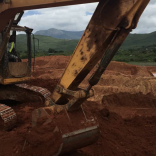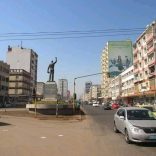Mozambique: Syrah suspends graphite operations in Balama - AIM report
Govt says production of biofuel from jatropha has become impracticable – Mozambique

O País / Almirate Dimas
The Ministry of Mineral Resources and Energy says that the production of biodiesel from jatropha should be abandoned because the resulting fuel costs more per litre than conventional gasoline and diesel.
Six years ago, growing jatropha for biodiesel was backed by the government as an alternative to importing fossil fuels. Mozambique was already a grower.
According to Almirante Dimas of the Ministry of Mineral Resources and Energy, when the biodiesel policy was made in the country, crude was above US$130 a barrel and it was economic to produce renewable fuels such as biodiesel and shale gas. But such projects are only viable when shale is above US$80 and when biodiesel is above US$100.
However, in the current context, where the price of crude has dropped, no one will be able to buy biodiesel whose cost of production, for example, is US$70 and fuel at the pumps costs US$50 to US$60. “It is not viable to use biodiesel now, because the cost of production is more than the price of conventional fuels,” said Admiral Dima, national deputy director of hydrocarbons and energy at the Ministry of Mineral Resources and Energy.
In principle, from 2012, an obligation to mix biofuels and fossil fuels should have entered into force. Gas stations were expected to mix 10 percent ethanol with 90 percent gasoline and 3 percent biodiesel with 97 percent diesel, percentages based on the capacity for the production of these fuels in Mozambique. At the time, it was believed that the fuel import bill, estimated at approximately US$500 million per annum, would be reduced by about US$22 million.
But the initiative, which had the support of the Brazilian government, did not come into effect because of the global economic crisis, which shrank funding until it became impracticable.
In fact, by 2014, the then Ministry of Energy, had admitted to various obstacles. Former renewable energy director Eusébio Saíde said that the financial crisis had halted the growth of the biofuel industry in Mozambique, scuppering projects that were already under way.
Today, the country is faced with high fuel costs due to the recent suspension of subsidies, which have maintained price stability since 2008. Prices are expected to rise gradually over the next few months to reach international market levels. The danger of this is that it drives up the price of all goods and services.












Leave a Reply
Be the First to Comment!
You must be logged in to post a comment.
You must be logged in to post a comment.